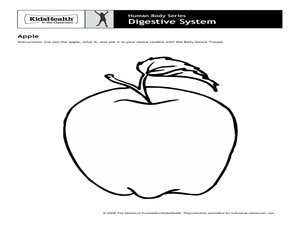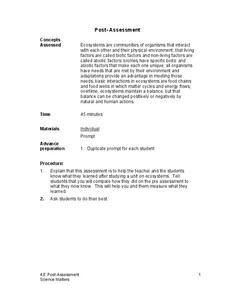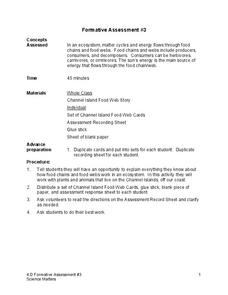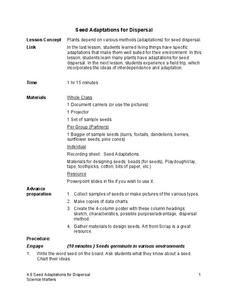Scholastic
Study Jams! The Nitrogen Cycle
Expose your class to the steps of the nitrogen cycle with this short clip. Colorful computer imagery and animation explain how nitrogen travels from the atmosphere as a gas into plants and soil, where bacteria convert it into nitrates....
Scholastic
Study Jams! The Carbon Cycle
Take a ride on the carbon cycle by watching this animated featurette. Those who do will learn about the element carbon, how it cycles through the atmosphere and biosphere, and how it contributes to Earth's temperature. This video comes...
Baylor College
Food Webs
Explore various ecosystems from around the world as your class discovers the interdependence of all living things. Using the provided sets of ecosystem cards, young scientists work in small groups building food webs to demonstrate the...
Baylor College
Fuel for Living Things
During a three-part lesson, learners make a cabbage juice pH indicator and use it to analyze the waste products of yeast after feeding them with sugar. The intent is to demonstrate how living organisms produce carbon dioxide, which is...
Scholastic
Study Jams! Population Growth
Along came a spider, who sat down beside her. She screamed, but RJ wouldn't smash it because spiders are a limiting factor for other insects in an ecosystem. In this video, other common limiting factors for populations are listed....
Scholastic
Study Jams! Ecosystems
With the forest as an example, Sam and Zoe talk about the components biotic and abiotic of an ecosystem. They also discuss the role of producers, consumers, and decomposers. This concise clip covers all of the basics. As an introduction...
Scholastic
Study Jams! Aquatic Ecosystems
Mia's friends are fish-sitting while she is away on vacation. Zoe divulges to Sam that different animals need different habitats, and that there are both freshwater and saltwater ecosystems. Examples of the kinds of organisms found in...
Scholastic
Study Jams! Food Webs
Rhinozilla is back to take your lesson plan on trophic levels a step higher! After showing the video on food chains (available through the See All Related Jams button), add to it by showing this one. It deals with omnivores and food...
Curated OER
Human Body Series - Bones, Muscles, and Joints
Strengthen understanding of the musculoskeletal system with a structured lesson! Begin with a discussion of bones, joints, and muscles. Have small groups read assigned articles and watch videos to gather information and then write a...
Curated OER
Human Body Series - Cardiovascular System
Pump up your class while studying the cardiovascular system with this pair of activities. In one, learners record heart rates during different actions. In the second, they read kid-friendly heart health articles online and then write a...
Curated OER
Human Body Series - Digestive System
With articles entitled, "What's Puke?" and "What is a Fart?" this digestive system lesson is sure to be a gas! Elementary anatomists do a belly dance to illustrate how food moves through the digestive system and then design a board game...
PBS
Plants Count
Changes to habitats mean changes to resources. Groups examine aerial maps to predict areas of low and high plant resources. After formulating a plan, they visit the areas to collect data about the plant resources and then share their...
PBS
Breaking Point
Leaf toughness can add to its herbivore appeal. Learns design an experiment to quantify leaf toughness and then perform their procedures. They follow the experiment with a set of questions that ask them to think about how leaf toughness...
PBS
All Tangled Up
It is a tangled web the ecosystem weaves. Learners begin an activity on ecosystem interactions by building a food chain and then a food web with yarn as a group. To finish, they research local environmental changes that may impact the...
National Wildlife Federation
Soil Decomposers
The class studies the soil food web that includes earthworms and conduct four experiments using the crawly critters. Individuals determine whether earthworms are sensitive to light, touch, temperature, and acid.
Science Matters
Post-Assessment
Twenty questions make up an assessment designed to test super scientists' knowledge of ecosystems. Scholars answer multiple-choice and short-answer questions about organisms, food chains, energy flow, and more.
Science Matters
Formative Assessment #3
Thirteen short-answer questions follow a brief food web activity in a formative assessment designed to test knowledge of ecosystems and the energy that flows through them.
Science Matters
Energy Flow
Budding scientists work collaboratively to reenact energy flow in a food chain. Scholars take on roles such as producer and consumer and perform tasks that symbolize energy flow in order to provide evidence of how much energy passes...
Science Matters
Crawly Composters
Get your hands dirty with an interactive instructional activity that showcases the process of decomposing and returning nutrients back into the soil. After building a compost pile, pupils regularly observe the...
Science Matters
Matter Cycles — Sum It Up
Scholars become part of the cycle of matter with a reader's theater that showcases producers, consumers, decomposers, and the sun. A diagram and discussion concludes the learning experience and enhances comprehension.
Science Matters
Mighty Microorganisms
How can you tell if a microorganism is helpful or detrimental to an ecosystem? Learners inspect slides or pictures of microorganisms and record their observations to identify those that are beneficial or harmful. They then pretend to...
Science Matters
Formative Assessment #2
Learners work collaboratively to predict what life would be like as an Arctic Hare. Teams go on a hunt where scholars role play an owl, white hares, and gray hares. Independently, pupils record their findings and reflect on their...
Science Matters
Lotusland
It's time for a field trip! Scholars take their new-found knowledge of adaptations and seed dispersal on a field trip to a local botanical garden. They gain an up-close look at how ecological interdependence works in a distinct...
Science Matters
Seed Adaptations for Dispersal
After a grand conversation about seeds, adaptation, and dispersal, scholars work collaboratively to examine seeds and record their findings on a four-column chart. Small groups share their observations and further discuss seed...




















